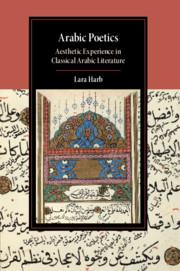Crossref Citations
This Book has been
cited by the following publications. This list is generated based on data provided by Crossref.
2021.
The Sufi Saint of Jam.
p.
271.
Leese, Simon
2021.
Arabic utterances in a multilingual world: Shāh Walī-Allāh and Qur’anic translatability in North India.
Translation Studies,
Vol. 14,
Issue. 2,
p.
242.
Salem, Zekeria Ahmed
2021.
Global Shinqīṭ: Mauritania’s Islamic Knowledge Tradition and the Making of Transnational Religious Authority (Nineteenth to Twenty-First Century).
Religions,
Vol. 12,
Issue. 11,
p.
953.
2021.
Opposing the Imam.
p.
236.
Cora, N. İpek Hüner
Lasman, Sam
and
Schine, Rachel
2022.
Approaching Islamicate fictionalities.
postmedieval,
Vol. 13,
Issue. 3-4,
p.
295.
Kotler, Ayelet
2022.
Dream narratives and metafictionality in the Persian Jog Bāsisht.
postmedieval,
Vol. 13,
Issue. 3-4,
p.
403.
Kanner-Botan, Allison
2022.
Rewriting the wild: Fiction, adab, and the making of Majnun’s animal world.
postmedieval,
Vol. 13,
Issue. 3-4,
p.
453.
2022.
Agents of the Hidden Imam.
p.
248.
Gupta, Vivek
2022.
Arabic in Hindustan: Comparative Poetics in the Eighteenth Century and Azad Bilgrami’s The Coral Rosary.
Journal of South Asian Intellectual History,
Vol. 4,
Issue. 2,
p.
181.
Jacobsen Ben Hammed, Nora
2022.
Women's Contemporary Readings of Medieval (and Modern) Arabic Philosophy.
Vol. 28,
Issue. ,
p.
127.
Jacobsen Ben Hammed, Nora
2022.
Philosophical Poetry and Courtly Appeal: Fakhr al-Din Rāzi’s Didactic Panegyric for the Khvārazmian Prince Nāser al-Din Malekshāh.
Journal of Persianate Studies,
Vol. 15,
Issue. 1,
p.
14.
Cumsille Marzouka, Kamal
and
Amar, Mauricio
2023.
Poética y política en la filosofía de al-Fārābī.
Res Publica. Revista de Historia de las Ideas Políticas,
Vol. 26,
Issue. 3,
p.
161.
Woodhead, Christine
2023.
The Ottoman art of word-painting. Rhyme and reason in seventeenth-century Turkish literary letters.
The Seventeenth Century,
Vol. 38,
Issue. 5,
p.
885.
Harb, Lara
2024.
Mimesis and Mythos in Aristotelian Arabic Poetics.
Comparative Literature,
Vol. 76,
Issue. 1,
p.
1.
Alhabian, Rama
2024.
Multilingual worlds in al-Ḥarīrī’s monolingual maqāmāt: A study of al-Maqāma ar-raqṭāʾ (the spotted).
postmedieval,
Vol. 15,
Issue. 3,
p.
687.
Cumsille Marzouka, Kamal
and
Carmona Tabja, Miguel
2024.
El Tratado acerca de las reglas del arte de los poetas (Qawānīn fī ṣināʿat al- šuʿarāʾ) de Abū Naṣr al-Fārābī. Presentación, traducción y notas.
Anales del Seminario de Historia de la Filosofía,
Vol. 41,
Issue. 1,
p.
237.
Arslan, Hakkı
and
von Hees, Syrinx
2024.
Rechtsnorm und ästhetische Reflexion.
Vol. 13,
Issue. ,
p.
45.
Mikkelson, Jane
2024.
Fayzi's Planetary Poetics.
Comparative Studies of South Asia, Africa and the Middle East,
Vol. 44,
Issue. 3,
p.
460.
Behar, Daniel
2024.
Forms of Hesitation:
Tadhabdhub
and Metrical Hybridity in Syrian
tafʿīla
poetry, 1962–1975
.
Middle Eastern Literatures,
p.
1.
Sherman, William
2024.
Finding the Qur’an in Imitation: Critical Mimesis from Musaylima to Finnegans Wake.
ReOrient,
Vol. 9,
Issue. 1,



